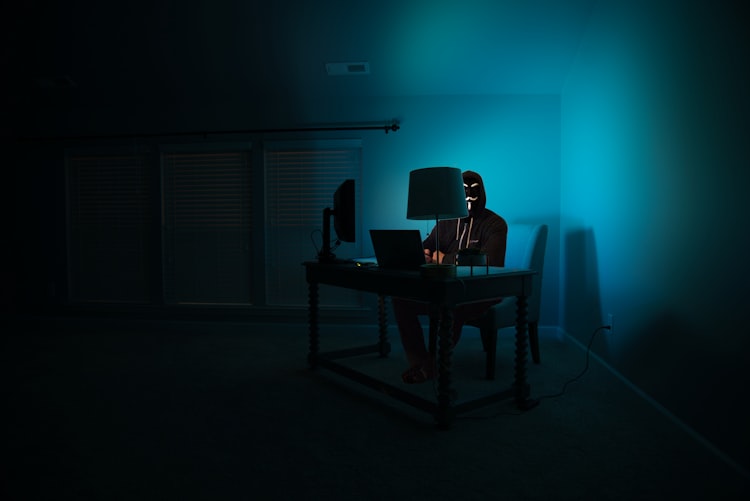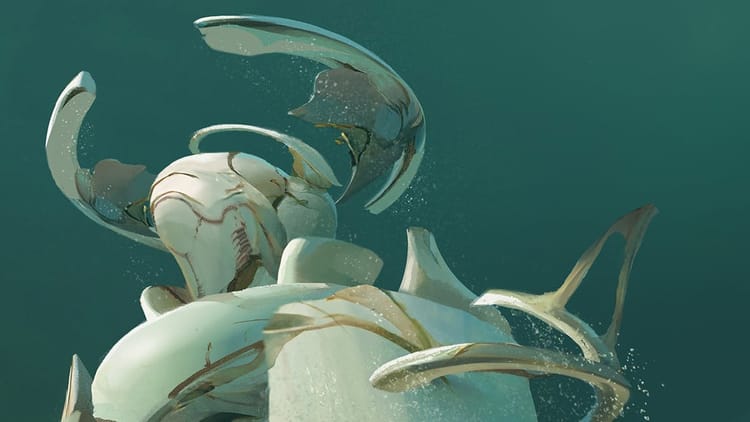Astrolabe 17: Growing up out loud with Patrick Klepek, Fabulous Nova Crystallis, and judging books by their covers
Growing up Out Loud

It was 2007, and I was 23 years old when I started a book blog called A Dribble of Ink. I had the fortune to be in the right place at the right time, and within a couple of years, it was one of the most popular independent science fiction and fantasy blogs. As a young writer, riding that wave was a thrilling experience, but it also gave me an outsized impression of my own opinion—leading to some problematic behaviour bolstered by youthful ignorance and arrogance.
Everyone grows into their job—we make mistakes, and hope to learn from them. To grow out our of our missteps. But when you're a writer learning on the job, your paper trail of mistakes impact a wide audience and are on display for all to see.
At 36 years old, Patrick Klepek has been professionally covering video games for even longer than I've been covering science fiction and fantasy. I reached out to the Senior Reporter at Waypoint (the gaming vertical of VICE) to chat about his experience as a young games writer, and what it was like to grow up in the wake of an industry undergoing tremendous change and growth.
Klepek chalks his youthful entry into games journalism to "luck and happenstance." Like many 30-somethings, he spent a lot of time on the Internet as a teen. When his family finally got home Internet access, he immediately started searching for content to enhance his favourite late night hobby: video games.
"That lead me to the IRC chat room for the online website Gaming Age," Klepek told me. Gaming Age shut down a long time ago, but it lives on through various message boards like NeoGAF and ResetEra—two games-focused communities that forked into politically-divided forums a few years ago. "Some folks who contributed to Gaming Age were foundational to the 90s era of Electronic Gaming Monthly, which means I somehow, by chance, ended up hanging out online with the editors of EGM at the age of 14."
Soon after, he was writing for Gaming age, and making enough dough that his parents absconded most of his pay cheques.

As much as the Internet's changed journalism, Klepek also put in good ol' fashion meat-space social networking by visiting the EGM offices. This was right around the time EGM was picking up steam online, thanks to their Internet-based sister publication, 1UP.com, which Klepek would later tell me helped shape the personality-based coverage adopted by much of modern games journalism.
"They let me hang out at their office, and many of them became lifelong friends," he said. "By the time I was heading to college and fumbling my way into a journalism degree, I had a bunch of friends who were the editors of major magazines. They offered me my first paid writing gigs, which helped me pay for rent and beer in college, and when I graduated, the current design lead of Destiny, Luke Smith, was leaving 1UP for Bungie."
He applied for the job, and was soon packing his bags for a move to San Francisco, the home of 1UP.com.
"The part that still throws me, though, is my dad," he laughed. "Can you imagine your kid coming to you and saying 'Hey, I met a bunch of older dudes online, and I want to go hang out in their office?' It's absurd. I can't tell if it being the early days of the Internet makes that story better or worse, but it's such a testament to my parents' own mix of trust and naivety that opened this door for me; my entire career is owed this moment."
Like Klepek, I did a lot of learning on the job in full view of a public audience. Writing is a constantly evolving craft, and the best way to get better is to write, publish, revise, and grow stronger. But it also means all your mistakes and stumbles are caught on camera. I cringe to think of some of the stuff I was posting on circa-2001 Final Fantasy message boards, and reading old reviews on A Dribble of Ink makes me want to crawl into a hole and hide until the heat death of the universe.
For Klepek, it means always focusing on the next story. "I don't spend much time thinking about something I wrote 10 years ago, despite suspecting I would now think it's trash. I've moved onto the next piece of reporting, the next rabbit hole to go down."

This interview with Patrick Klepek is part of Transmission Received, Astrolabe’s ongoing interview series. Two days after Astrolabe publishes, paid subscribers get early access to full transcripts or video interviews via a separate mailing.
This feature is being provided to all free subscribers for the first six interviews. (This is the fourth interview.) If you’d like to continue to receive them, or would like to support Astrolabe’s growth and maintenance, please consider subscribing.

Klepek pointed to the popularity of South Park and his place within "the generation that grew up alongside the creation and mainstreaming of the Internet," and how those factors helped shaped his online personality online during his teenage years. "You can make some pretty accurate guesses at the way I was talking in my formative years as a writer/person.
"I don't think my writing was infested with edgelord bullshit. It's mostly the way I conducted myself online at a young age. A combination of not knowing any better and a limited world view from suburbia proved to be something I've had to grow from in the years since."
The Internet never forgets, and Klepek told me some of his immaturity is "semi-permanently crystallized online," becoming fodder for far-right trolls—but he's found peace with his past work and is no longer stressed out about it. "The people I work with know what my values are, the person I'm always trying to be, and that I emphasize empathy.
"What I've come to realize is that part of living life is, at times, reminding yourself of that person you used to be, because you can't appreciate how far you've come without sitting with the past."
It's not only Klepek who's grown up in the past 15 years—it's the whole games journalism industry.
"It's never been easier to get published, right?" Klepek said. "It's extremely easy to start your own blog, write a clever tweet, and hope that goes viral. In that sense, games writing—criticism, journalism, whatever—is more democratized and accessible than ever. But that's also a curse, because so many people are in the field, too, and it's harder to get noticed in the haze.
"Writing is the most important part, however it happens. Even if no one reads it. It's so much easier to sit on a good idea and watch it wither away, than it is to see that piece to completion."

A huge stumbling block for a lot of young writers is the pitch process. To land a freelance piece, writers have to craft a snappy summary of their work to convince editors that their story is a) important right now, and b) they're the best person to write it.
"The art of the pitch is really difficult," said Klepek, speaking as someone who reads a lot of pitches each week. "You can't get an editor to sign off on a piece without a good pitch, and a good pitch is all the more important if your name isn't well-known, and an editor is deciding whether to take a chance on you. Spend more time working on your pitches, even if that means having people edit your pitches. It's that important."
There's one common mistake Klepek often sees from newer writers: inflated word count. "The moment I see a writer saying it'll take 2,000 or 3,000 words to fully write whatever they're pitching, my eyes roll into the back of my head. You need to be a pretty established writer to pull something like that off, because in most cases, you can do a lot more with a lot less. That many words is just a way for a young writer to get into a lot of trouble, and for an editor who's taking a risk to realize they may not want to work with that writer next time."
A good pitch, Klepek said, will be "concise, clear, and specific about its story," and he wants to be surprised. "Your best bet for trying to get something past us [at Waypoint] is looking beyond the 24-hour news cycle. What are the things that keep cropping up in the discourse, and what's it say about gaming culture?"
Growth is about more than just the options for writers, it's also how journalists are covering games and the games industry compared to when Klepek started writing for Gaming Age. "It has a much sharper edge than it ever did, and it's for the better," he told me."And that sharp edge is being pointed in the right direction (most of the time), which definitely wasn't always the case in the past.
"People are smarter, and there's a wider group of voices contributing to that shared base of knowledge, criticism, and reporting. Most people used to look exactly like me, and while that's still mostly true, it's also changing rapidly. (I wish that audiences were less hostile about it, because I think we keep losing potentially transformative writers who, understandably, do not want to be harassed!) It's been encouraging. One way to view that change is to be afraid of it and become defensive. Another way to view that is as a challenge to stay interesting, relevant, and introspective."
As I was chatting with Klepek, news came in that Giant Bomb—a hugely popular gaming site created after an exodus of writers from Gamespot in 2007—was losing several key writers (Alex Navarro, Brad Shoemaker, and Vinny Caravella) all of who were with the site since its inception. This news rocked the games community, and offered Klepek, who once worked for Giant Bomb, an opportunity to reflect on the personality-based journalism that defines modern games writing.
"1UP.com accidentally stumbled into the notion of turning previously anonymous games writers into bonafide personalities," he said. "Bylines mattered, because you aligned your taste and preferences with them. You knew people's names. Giant Bomb took what 1UP.com stumbled into and turned it into a business model. Giant Bomb wasn't just a website to a lot of people, it was a family.
"But all things come to an end. Giant Bomb only happened because Jeff Gerstmann was fired from GameSpot. Austin Walker was only hired by Giant Bomb because I decided to leave for Kotaku. A door closes, a door opens. That's what's happening here, too. I'm not sure it tells you much about the future of games journalism yet because it matters what happens next."

Patrick Klepek is a Senior Reporter for Waypoint, where you can find most of his work. When they find time, Klepek and his wife record Til' Death Do us Part, a podcast about horror movies. He can be found on Twitter at @patrickklepek.
Out & About
(Out & About is where I highlight my work around the web—some recent and some old favourites.)
Please, Judge This Book By Its Cover - Uncanny Magazine — uncannymagazine.com
Everybody knows the old adage: don’t judge a book by its cover. To the relief of writers everywhere, however, readers ignore it all the time.
We've all done it. You walk into the bookstore, and, adage-be-damned, walk out with a shiny new book you fell in love with without even reading the jacket copy. Book covers are a huge part of marketing and selling books, and in this Uncanny Magazine piece called "Please, Judge This Book By Its Cover" I spoke with Irene Gallo and Lauren Panepinto—two women who have defined the look of science fiction and fantasy for the past decade—and several artists to understand how covers get made, marketed, and sold.
Everybody knows the old adage: don’t judge a book by its cover. To the relief of writers everywhere, however, readers ignore it all the time. Cover art is a book’s first opportunity to impress a reader—if it’s not begging to be read, there are a million others waiting. As hard as the author has worked to write a best seller, there’s a world of artists, marketers, booksellers, and art directors burning midnight oil to make sure that book has a chance when it finally hits store shelves.
Read "Please, Judge This Book By Its Cover" on Uncanny Magazine
Some more:
- Hayao Miyazaki’s Lost Magic of Parenthood (Uncanny Magazine)
- Timeless: A History of Chrono Trigger (Insert Cartridge)
- There Is No Universal Canon (Here’s The Thing)
- The Black Elfstone is the Beginning of the End for Terry Brooks’ Shannara (Barnes & Noble Sci-Fi & Fantasy Blog)
LTTP—Final Fantasy XV (2016, PlayStation 4, Xbox One))
( LTTP stands for “Late to the Party” and is a regular column where I let Twitter decide which retro game I’ll play for an hour. Do your worst, Twitter!)
This time around, we've skipped a poll for this issue's LTTP and are taking a retro modern game for a spin. Why? Because it's a divisive game, and I'm really keen to talk about it.
See, I liked it. A lot. Which surprised me. A lot.
Final Fantasy XV might've come out in 2016, but it was first announced as Final Fantasy Versus XIII waaaaaaay back in 2006. Using the Retronauts system of "ten years or older is retro," I figured I'd go for it. (Hard to believe it's almost legitimately halfway to that milestone.)

From its original announcement as a Final Fantasy XIII spinoff to its eventual release as a mainline entry in the long-running Japanese RPG series, Final Fantasy XV's development became the ur-example of the games industry's struggle to grow with technology, and how lack of vision and leadership can sink even the mightiest ship.
But, it did eventually come out.
Unfortunately, the vanilla release that many players experienced (it quickly became the best selling title in franchise history) was flawed and obviously unfinished. The Final Fantasy team made valiant efforts to improve the game through several patches and DLC episodes, which eventually led to a more definitive version: The Royal Edition, which is what I played.
The improvements made in the Royal Edition are still like unpainted plaster over the original's holes, but they smooth over the experience just enough (coupled with my low expectations, given critical and fan coverage) to create an experience that's enjoyable despite everything working against it. Through its flaws, you can see a lot of what could have made it something really special under different circumstances.

The thing that surprised me the most is how the writers managed to stuff so much heart and soul into the game's story, characters, and world. There's a lot to lament about the small playable cast and dearth of playable female characters—the game would have been improved with more development for characters like Iris, Aranea, and Lunafreya—but the focus on the bros created a tight-knit camaraderie that felt better realized and more natural than almost any recent Japanese RPG that's not Persona. The game is full of big bombastic moments, where the bros literally pull each other out of the hellfire—but it's also packed with poignant moments of quiet intimacy and open emotion.
After Final Fantasy XIII's doubling-down on Proper Nouns, made up words, and plot before character, Final Fantasy XV sets itself apart in the best way by telling a simple story where plot is character and vice versa. It follows Prince Noctis and three of his closest friends on a road trip leading up to a royal wedding meant to bring the prince's kingdom of Lucis together with Tenebrae, home to his betrothed, Princess Lunafreya. Things, as always, go awry.

The game's narrative issues are well documented, and it's very clear it was released in a rushed, poorly put-together state—with the latter chapters either blazing by in minutes, or dragging out for hours, and featuring a very different tone and structure from the opening first chapters. It's all the more impressive, however, that the game still manages to remain compelling and emotional despite all the structural and pacing issues. I daydream about the alternate universe where Final Fantasy XV was untroubled by development issues, and came out in a polished, fully realized state. That dream version of the game could very well be my favourite modern instalment in the Final Fantasy series.

As it is, Final Fantasy XV surprised the heck out of me, and firmly finds itself in the upper half of my series ranking—hovering right there with Final Fantasy IV, VII, and VIII. It's a flawed gem, but despite some cracks, its beauty shines through and earns its reputation for being unique and daring in a genre famous for being risk averse.

Final Fantasy XV is available now for the PlayStation 4, Xbox One, Microsoft Windows, Google Stadia.
Recommended Reads

Press Reset: Ruin and Recovery in the Video Game Industry by Jason Schreier
Jason Schreier's well known for his online coverage of working conditions in the games industry (and Japanese RPGs, of course), but the co-host of the Triple Click podcast and Video game reporter for Bloomberg News has just released his second book. Press Reset: Ruin and Recovery in the Video Game Industry is a look at what happens after games studios close, and presents a grim narrative of the human cost to gaming's insatiable hunger for profit. Like his first book, Blood, Sweat, and Pixels, Press Reset is effortlessly easy to read, and highlights Schreier's knack for couching broad narratives about the games industry within personal stories that showcase the people behind the games.

Press Reset: Ruin and Recovery in the Video Game Industry by Jason Schreier is available now from Grand Central Publishing
Quest Markers
(Quest Markers is a collection of the coolest stuff I’ve read around the web lately.)
- What we owe and are owed (Vox)
- The Women Who Invented Video Game Music (Wired)
- DisneyMustPay: authors form task force to fight for missing payments (The Guardian)
- Final Fantasy: Mystic Quest Is the Best Final Fantasy You've Never Played (Paste)
- The Repressive Politics of Emotional Intelligence (The New Yorker)
- Sinead O’Connor Remembers Things Differently (New York Times)
- 'Mortal Kombat' Succeeded Beyond Its Creators' Dreams, Just as They Planned (Waypoint)
- Wild Thing's Laura Krantz about exploring the unknown (Transfer Orbit)
- Twitter: "Buying a PC with Dell: My Journey Into Hell"
- How to do an on-screen accent—and why it can be okay (Maclean's)
- Izuho 'IPPO' Numata On Working At Early-'90s Sega And Composing Phantasy Star IV (Kotaku)
- Podcast: ‘The Left Hand of Darkness’ Is a Sci-Fi Classic (Geek's Guide to the Galaxy)
- Twitter: "STOP USING THE TERM "FAN FICTION" FOR THINGS THAT ARE NOT FANFICTION CHALLENGE, 2K21"
- 35 Years Later, Studies Show a Silver Lining From Chernobyl (Wired)
- Here’s what The Legend of Zelda: A Link to the Past looks like as an RPG (Nintendo Enthusiast)
- Izuho 'IPPO' Numata On Working At Early-'90s Sega And Composing Phantasy Star IV (Kotaku)
- 'F---, let's go do it': An oral history of The Fast and the Furious (Entertainment Weekly)
- What It's Like to Localize a Yoko Taro Video Game (Waypoint)
- These Are Your 2021 World Video Game Hall of Fame Inductees (Kotaku)
- Real Talk: You Should Just Ignore the Star Wars Prequels and Read the Episode III Novelization (Tor.com)
- Hidetaka Miyazaki’s Middle Earth (Unwinnable)
- USC Games establishes Gerald A. Lawson Fund to help Black and indigenous students (GamesBeat)
- Guy Gavriel Kay on why writing fantasy fiction about destiny, dominion and deceit will never go out of style (CBC)
- Mythic Quest season 2 is much more than the ‘video game sitcom’ (Polygon)
- The Powerful, Complicated Women of Resident Evil (Wired)
- Of models and memes: Women are reclaiming their images via NFTs (Input)
- Vietnamese Myth and Magic Come Alive in Hoa (Wired)
- Meet the mystery woman who mastered IBM’s 5,400-character Chinese typewriter (Fast Company)
End Step
This issue has been brought to you by video games.
Support Astrolabe
There are lots of ways to support Astrolabe and my other work. Check ‘em out!
Keep in Touch
Enjoy Astrolabe? Want more SFF and retro gaming goodies? You can find me on Twitter and my website.
Credits
Astrolabe banner photo by Shot by Cerqueira on Unsplash






Member discussion